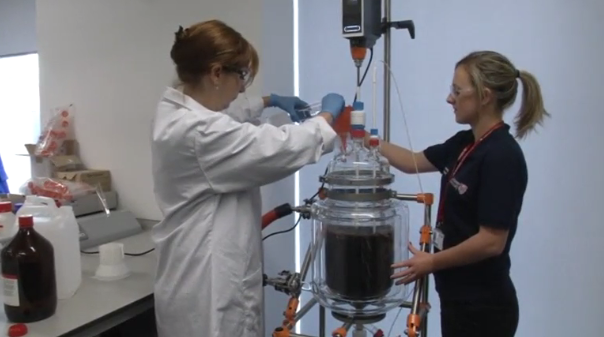
LONDON, England (Reuters) — A new one-step process that turns spent coffee grounds into biofuel could help in the fight to reduce our reliance on diesel made from fossil fuels, say researchers at Lancaster University.
Using feedstocks, such as soybean, rapeseed, or corn, grown specifically to extract oils to make biodiesel is controversial because of their cost and because they divert crops from food production.
Lead researcher Dr Vesna Najdanovic-Visak told Reuters: “These kind of food crops are not really ethical or sustainable, since we have a lot of people hungry on this planet.”
Spent coffee grounds, the waste left after brewing coffee, have a high calorific value, making them ideal for conversion into biofuel. Most coffee grounds are currently dumped in landfill.
“We produce biodiesel out of these spent coffee grounds by extracting using oils that are naturally present in this waste,” said Najdanovic-Visak.
A small number of companies already use collected coffee grounds to make biofuels, but their process takes multiple stages. The method developed at Lancaster, called in situ transesterification, works in a single process.
“In situ transesterification couples extraction and reaction into one single step. When we couple two operations in a single step we usually get lower processing and investment costs,” said Najdanovic-Visak.
Usually manufacturers mix spent coffee grounds with hexane and heat the mixture at 60°C for up to two hours. The hexane is then evaporated, leaving behind the oils, before methanol and a catalyst is added to make biodiesel and a glycerol by-product, which requires further separation.
The Lancaster team managed to combine the processes by using just methanol and a catalyst, saving on chemical waste. The process can also be optimised in just ten minutes.
Researchers believe their discovery significantly increases the commercial competitiveness of making biofuel from coffee.
“First of all we would target coffee shops and catering facilities. There are already companies collecting this waste and composting them or using them as anaerobic digestion. Probably the next step would be to collect coffee grounds together with household recyclable material,” said Najdanovic-Visak.
Najdanovic-Visak says the biodiesel produced could be used directly in fuel tanks, but more realistically would be blended in small amounts into existing biofuels.
“We are not claiming that we will save the whole planet. But it’s one of those puzzles where different technologies could contribute to the overall picture.”
The research was published by the Journal of Environmental Chemical Engineering and was co-authored by Florence Yee-Lam Lee, Marcia Tavares and Alona Armstrong, all from Lancaster University.







